Hello! This is Nikki, Lead Veterinary Technician with Posh Dog Knee Braces. Today let’s go over how to break-in a new Posh Custom Dog Brace. First, we want to take things nice and slow. You wouldn’t take a brand new pair of boots to Disneyland resort for 10 miles of walking each day I hope. Neither should we put a custom brace on a dog for 8-12 hours without first working into that time. Just like in people, a dog’s skin needs some time to get adjusted to wearing something.
Over the next few weeks, as we gradually increase the times we have them in the brace, the skin will start to thicken and get stronger. Just like our feet do with a new pair of shoes. After a few short weeks, they should be able to tolerate wearing the brace longer and longer.

In the first 1-2 weeks, we suggest only using the brace during short leashed walks. This is to get your dog used to walking in the brace, to prevent soreness, and to get their skin used to having something touching. It can take a patient sometimes up to 3-4 weeks for the soreness in the muscle to get better, just like if we did physical therapy.
You wouldn’t want to run a 10K marathon with no practice or training, right? Even if your dog was walking 4+ miles each day before the injury, we now have atrophy and muscle loss (yes even if its only been a few weeks). Starting out with nice slow walks, and building up the times slowly, will really help prevent soreness and rubbing issues.
We typically don’t see rubbing sores with Posh, because we are so clear on our direction to our clients. Wearing the brace gradually more and more each week, really helps them adapt to having something touching their sensitive areas. The upper groin and ankle area seem to be the most common areas we see any irritation, and usually if the brace was worn for too long too fast. Doing 10-15 minutes twice daily for 2 weeks, then adding 15 minutes weekly to their walk schedule will really help.
We have this break-in schedule completely broken down for our clients in the handouts we send after the brace has been fit properly with a technician. A custom brace should never be worn right off without some sort of consultation, to ensure proper fit and make sure your dog is using the brace properly. Any company that does not do this is a red flag in my book.
Let me know if you have any questions about our break-in schedule! Please contact us via our contact page or visit our Facebook Page.
Nikki, Posh Lead Veterinary Technician
Reiki is a form of alternative therapy that originated in Japan and is based on the concept of channeling healing energy through the practitioner’s hands. While scientific evidence supporting the effectiveness of Reiki is limited, some dog owners and practitioners believe that it can provide various benefits for dogs. It’s essential to note that Reiki should not replace conventional veterinary care but can be used as a complementary approach.

While some dog owners report positive experiences with Reiki, it’s important to approach it with an open mind and consult with a veterinarian before incorporating it into your dog’s care plan. Always prioritize conventional veterinary care for diagnosing and treating medical conditions.
For more information on how to help your dog recover with their injuries or if you are interested in a Posh Dog Knee Brace you can contact us via our contact page or visit us on Facebook.
Hey guys, this is Nikki Lead Veterinary Technician with Posh Dog knee Braces. This is one of my most common questions asked will my dog need a knee brace forever for a CCL/ACL tear?, and I would like to dive deeper to answer this question, as there is more to the answer than simply No.

First off, the majority of my patients will use the posh dog knee brace for about 9 months, sometimes up to 12 months if they are a larger breed or have a minor meniscal tear. We know that scar tissue is mature by the 9-12 month point, and at the juvenile stage around month 2-3. If someone tells you that your dog will be permanently using the knee brace, they are simply misinformed. There are actually quite a few studies in both humans and animals, proving the timeline of scar tissue formation.
In surgical sites, or areas of soft tissue, scar tissue can form much faster, forming a thickened scar within weeks. This is different from the fibrous tissue that forms in a joint, and gives us regained stability. Let me ask you this, have you ever sprained your ankle or injured a joint?
Did you use a splint or a knee brace to help that joint recover? I know I have. Depending on the joint, and amount of muscle you were able to keep with physical therapy, also plays a key role in the longevity of using the brace. We do not want to keep the brace on forever, however, in some severe arthritis cases, or luxating patella issues, bracing longer term as needed may be necessary.
How do you know when it is time to take your dog out of the knee brace? Time will tell on this one. Most dogs are ready to go, and fully weight bearing by 9-12 months. However, if you were unable to complete the physical therapy recommendations during the recovery times, your dog may need longer in the brace while they acclimate slowly to walking without the brace on.
This needs to be a slow weaning process, so as not to cause a re-injury. Take your dog for a nice leash walk, without the brace. If you dog does great, and has no sign of a limp or gait that is off, then you can continue to leash walk without the brace for a bit longer until you feel comfortable letting your dog resume activites.
Some dogs may need a little longer than 12 months, such as patients with meniscal tears or arthritis, or if there was a re-injury during the healing process. This is still not forever, I would take things month by month until you are successful at walks without the brace on. Our service technicians are happy to answer any questions you may have about this process, and there is really not a wrong answer. If you feel more comfortable having your dog wear the brace longer, and your dog is doing great, that’s ok!
I would suggest our Posh led support group on Facebook, where you can talk with thousands of other clients who have all used the posh brace to recover. This is a great place to learn more about what to expect, and get great advice from both our technicians and previous customers.
To sum everything up, we do need to make sure to use the brace as directed for at least 9 months, but that is usually adequate for the majority of our clients. Please check out our website, poshdogkneebrace.com, for further tips and information that may also be very helpful, you can also reach out to our facebook page as well for information.
Dog Knee Recovery Without Surgery
By Rosemary Levesque, Licensed Spiritual Healer
Second Nature Healing®https://secondnaturehealing.com
Rosemary@secondnaturehealing.com or call directly 503-747-3307
The following article is written in gratitude to Posh Dog Knee Brace for their support during Gracie’s recovery from a torn CCL. Gracie wore the brace and healed well without surgery. In honor of Gracie who had a long healthy life, I’m offering:
The cranial cruciate ligament (CCL) in dogs is a band of connective tissue that connects the upper leg bone (thigh) to the two lower leg bones (tibia and fibula) at the knee joint – called the stifle in dogs. The CCL helps stabilize the stifle, and is highly vulnerable to tears which destabilize the joint. Damage to the knee joint is the leading cause of rear-leg lameness and the major cause of degenerative joint disease in dogs. (1)
If you can’t wait to get started with healing and recovery, please begin here.
My number ONE product source for healing and recovery is https://avinihealth.com/rosemary.
These products are designed with humans in mind, but with my years of experience working with animals, I know how critical it is to use these products, safely and easily, across the board, with all species. Call me for a consultation on how to help your dog heal faster, without surgery, using the Posh Dog Knee brace and my products.

There are many situations that could result in a CCL tear:
Contributing factors like obesity, genetics, and general health may also have a role in causing a torn CCL. Since animals are excellent at hiding their injuries and illnesses, you’ll want to be especially observant if you suspect a tear. In addition to limping or lameness, watch for muscle atrophy in the thigh or imbalance in the spine.
When Gracie jumped into the car as usual one beautiful spring day after a pleasant walk in the park, she yelped in pain. Yet after her initial jolt, she seemed fine. She ate and walked normally for several weeks until we had our next vet visit, a yearly wellness check-up. Suddenly she picked up her hind leg, revealing her lameness. It surprised me that she’d wait until we were in his office to say something about her problem. She hadn’t shown me any sign of lameness since the incident a few weeks prior.
A veterinary examination for stifle injury usually includes manipulation of the joint and is called a “drawer test”. Physical manipulation of the joint forces the ligaments to stretch and tear more. Unfortunately, it was an issue and Gracie became obviously lame after that. That’s why I add this test to the list of causes. Even if a small tear already exists, it can worsen after such manipulation. If you suspect a torn CCL, do NOT allow your vet to perform the drawer test.
Our vet suggested that we see a specialist for CCL surgery. He also offered cold laser treatments at his clinic to help speed healing and recovery. I felt hopeful about Gracie’s healing and recovery with the healing methods I already know and use. So, in addition to frequent cold laser treatments, my plan included Reiki, essential oils, and acupuncture. I opted to not have invasive, expensive surgery.
The most common response to a torn CCL is to perform a surgery called Tibial Plateau Leveling Osteotomy (TPLO). In this surgery, the tibia, a lower leg bone, is cut (leveled) and rotated to change the direction of movement. A plate is added to secure the new location of the joint. Following weeks of immobility and pain management with medications the problem may be resolved. The cost of surgery and x-rays may range from $2500 to upwards of $6000.
However, cost isn’t the only issue to consider. Weeks of restrained immobility are not only depressing for your active animal, but difficult to control and have other effects such as weight gain, muscle atrophy, and risk of infection as well as the risks associated with the surgery itself. Pain medications can often have harmful side-effects. More importantly, studies now show a definite link between TPLO surgery and osteosarcoma (bone cancer) at the site of surgery.
“. . . dogs with a history of TPLO were 40 times as likely to develop proximal tibial osteosarcoma as were dogs with no history of TPLO. In addition, each 1-kg (2.2-lb) increase in body weight was associated with an 11% increase in the odds of proximal tibial osteosarcoma.” (2)
What’s really best for your dog? Is there another way?
Gracie did well with the holistic methods I used to support her healing. Most importantly, we were still able to walk her short distances while she gradually improved. We purchased a set of stairs for the car so she wouldn’t jump into the car anymore to risk further injury. We added specific supplements to support joint healing and repair.
All of it worked pretty well until one cold winter day when Gracie slipped on the ice. She reinjured her CCL and was in obvious pain. Back to the start once again, I panicked and scheduled an appointment with a surgeon for that week. Fortunately, my intuition told me to keep looking. That’s when I found the REAL ANSWER that saved Gracie’s knee and allowed her to heal – finally – without surgery.
I began searching for a knee brace for Gracie and discovered that they fall into several categories:
Of course, the custom fit seemed like the better way to go, and quality, durability, and customer service and support were also important. That’s when I finally found Posh Dog Knee Brace. (3) They provide a way to make a custom fit brace with highly durable materials that are waterproof (and beach-proof) and long-lasting with a superior guarantee. Their fast service provided us with a custom-fit brace for Gracie in just days.
Immediately on the first try-on, Gracie was able to take her first steps. We started using the brace for short walks until she regained her strength and balance. That’s when I noticed how much she had been compensating for her injury. She was finally able to walk straight without limping, and without any curve or adjustment in her spine. The thigh muscles which had atrophied began to get strong once again. We continued with natural healing techniques and tools which were much more effective now that Gracie had the support of her brace to stabilize the stifle.
There may be little difference in perceived success when comparing TPLO surgery to using an ordinary or inferior knee brace (one that doesn’t fit properly or doesn’t fully support the stifle joint). I believe the real differences come in the form of ease and comfort while healing as well as from the quality of the brace. Many of the sites I investigated, including articles from the American Veterinary Association, Veterinary Medicine websites, and holistic journals gave a more comprehensive picture. Surgeons at the School of Veterinary Medicine at the University of Pennsylvania don’t use TPLO surgery.
Dr. Amy Kapatkin, a board-certified orthopedic surgeon says, “Why break a bone to fix a ligament” (4)
It’s critical to support healing from every angle while the stifle joint is stabilized.
[1] https://www.petmd.com/dog/conditions/musculoskeletal/c_dg_cranial_cruciate_ligament
[2] Association of tibial plateau leveling osteotomy with proximal tibial osteosarcoma in dogs
Journal of the American Veterinary Medical Association
September 15, 2018, Vol. 253, No. 6, Pages 752-756
Laura E. SelmicBVetMed, MPH; Stewart D. Ryan BVSc, MS; Audrey Ruple DVM, PhD; William E. Pass DVM; Stephen J. Withrow DVM
Flint Animal Cancer Center, Department of Clinical Sciences, College of Veterinary Medicine and Biomedical Sciences, Colorado State University, Fort Collins, CO 80523. (Selmic, Ryan, Pass, Withrow); Department of Comparative Pathobiology, College of Veterinary Medicine, Purdue University, West Lafayette, IN 47907. (Ruple)
[3] https://www.secondnaturehealing.com/docs/Posh%20Flyer%20Gracie%20-%20SecondNatureHealing.pdf
[4] https://www.whole-dog-journal.com/issues/13_2/features/Dog-Surgery-Alternatives_16198-1.html
Hey guys, this is Nikki, Lead Veterinary technician with Posh Dog Knee Braces. Today let’s discuss bracing after surgery. So, your dog had CCL surgery, be it TPLO, TTA, or Lateral suture. Now you are wondering what can be done so that your dog does not have to go through that a second time. Is there a way to prevent a second knee injury? Let’s dive deeper into this very controversial topic.
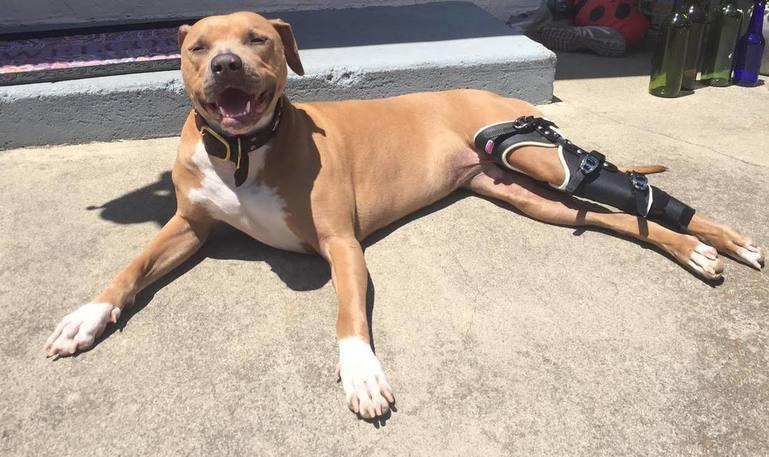
First off, the statistics don’t lie. Once a dog has a CCL tear, there is a good chance the other leg will go. Now, this is not a guarantee, but it is very common. The reason? Your dog is now overcompensating on the good legs, as the injured leg is not able to weight bear as it used to. Even after surgery, which can take about 8+ weeks to recover, there is a 2 month plus period where your dog is still overcompensating on the other side. In order to help your dog recover smoothly, you might consider a knee brace for bracing.
What can a knee brace do for the good leg? Well, it can help prevent an injury. After surgery, your dog will need to be on bed rest for the 2 month period, however, after that there will be a time to do physical therapy. There will be some amount of atrophy in the surgical leg, until we get mobility back, and it is hard to say how long they will overcompensate. This is why there is a higher incidence of second knee injuries in patients that have surgery. Now, if we brace post-operatively, we can hopefully prevent the second knee from tearing, and give your dog a much smoother recovery period.
Some patients will also choose to brace the post-op leg as well, depending on the surgery performed. If you chose to do the lateral suture surgery, then I would definitely brace both legs post-op, as the time of overcompensating post lateral suture is much more than with TPLO or TTA.
So, by bracing the second leg we can not only help your dog with a much smoother recovery period, but we might be preventing a second injury all together. Many of our patients brace post-op with great results so far. This gives you peace of mind that you are doing everything possible to get your pup back in top form.
As always let us know if you have any questions about bracing! You can email us through our contact form, and my phone number is 509-412-3065. You can also check out more information on our Facebook Page.
This is about half of the people I speak with on a daily basis. Puppies are wonderful, and really do bring our families and other dogs joy, but sometimes that comes with a cost. Whether you bring home the puppy before an injury on your older dog, or after, we still need to be careful when they play. Rough play, such as puppy jumping on their back or playing tug of war, can result in new injuries, or aggravating an older injury. Puppies bring on a youthful playing with our older dogs, which is fun to watch, however, it can encourage injuries, so please be careful.

Choose a breed carefully. If, for example, you have a small breed older animal, and bring home a large breed puppy, there is going to be some potential to be injured. Puppies, as part of play, will try to jump on the other dog’s back. This is their natural tendencies trying to establish dominance. Well, if your poor older animal has hip or knee issues, you can imagine that this may not be the best case scenario. Thus, it is important, to only let them have supervised play times, and not be left alone to rough play all the time.
This is especially true if your other pet has a recovering knee injury. Not only is it going to be tough to get that knee to recover with a puppy wanting to play, but the puppy will also be very curious about this really cool chew toy on their leg! So, again, supervision at all times is going to be needed. I’m not saying you can’t get a new puppy, but think the scenarios through before you adopt. Or, perhaps look into adopting an older doggy instead of a new puppy.
Puppies are going to be growing and teething for at least a year, if not more. This means their energy will be high, and your injured dog’s tolerance for this may be low. Make sure you have the means to keep them separated when you are not home or there to supervise, because that would not be otherwise fair to your older injured dog.
Get lots of fun distracting toys for the puppy to play with (and don’t forget your older pup!). This really helps keep them distracted, and happy. If your older dog has a posh brace on, to support a CCL injury, it is ok to have them play for a little while with the puppy, but only directly supervised. The brace does act as a shock absorber, so a little play is ok, but no running or jumping while playing. My puppy likes to stand up on her back legs to “box” with my other dog. This would not go over well if my other dog had an injured leg.
Again, feel free to check us out at poshdogkneebrace.com, or email us through our contact form or visit us on our Facebook page.
Read reviews check out our Google Reviews online. Click Here
Today I would like to talk about recommended activity levels with a brace or CCL tear. It is still important to remember that this is not a race.
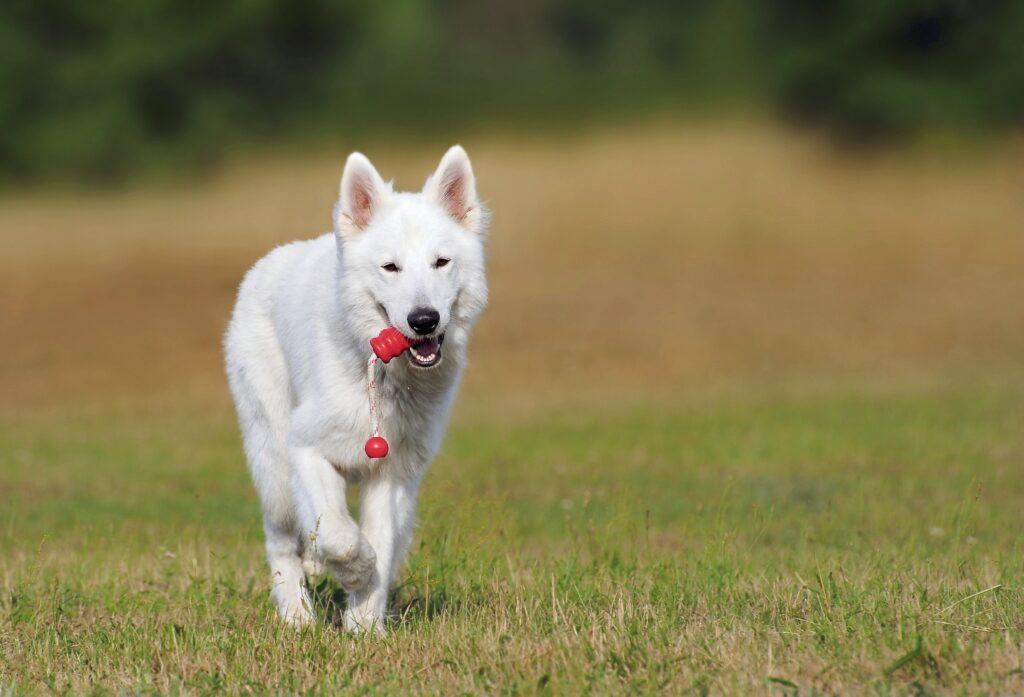
Initially, we start with walks and light physical therapy and massage. Gradually, we can increase activities, such as adding hills or inclines to the walk, sit stands, more muscle building activities.
It is not recommended to let your dog run off leash while in recovery. This can lead to injury of the other leg potentially. Braced walks are meant to be nice and slow, not a jog. The goal is to have your dog placing full weight down on his leg. If you walk or run too fast, they will skip and not place full weight on the leg.
We will get to a point where your pup can play off leash, but ask first, and take things slow. Feel free to email or send in a contact request with any questions about what levels of activity is right for your dog, we are happy to help! You can reach out to use through our contact form or visit us on our Facebook page.
Give Your Dog a Big Hug From Us!
Nikki, Posh Lead Veterinary Technician
Read reviews check out our Google Reviews online. Click Here
Did you know a Posh Dog Knee Brace can help your Dog recover from a torn knee ligament, CCL injury, or ACL injury – without surgery? Many Dogs are not good candidates for knee surgery due to age, medical issues, and high surgical costs.
Dog knee procedures have a serious complication rate of over one in three, and their overall success rate is far below 40%.
Your dog can recuperate pain-free and without complications with the aid of a bespoke Posh Dog knee brace. By allowing your dog to develop scar tissue, our brace helps the wounded knee area heal in a manner similar to surgery.
Wearing a Posh brace, many Dogs have successfully recovered from a total CCL ACL tear without surgery.
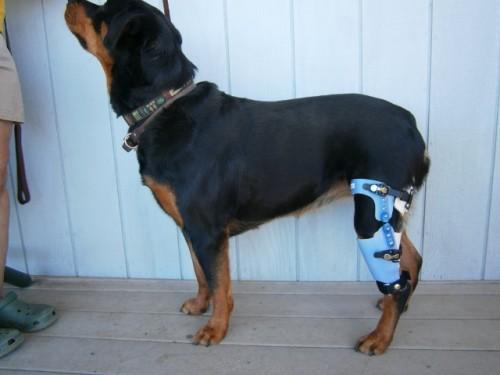
Read reviews check out our Google Reviews online. Click Here
They prevent prostaglandin synthesis (1). All cells in the body manufacture prostaglandins from fatty acids. Prostaglandins of many sorts regulate inflammation in the body.
An enzyme system transforms arachidonic acid into prostaglandins when tissue injury occurs. There are two forms of cyclooxygenase that perform this conversion: cox 1 and cox 2. NSAIDs can block cox 1, cox 2, or all of them.
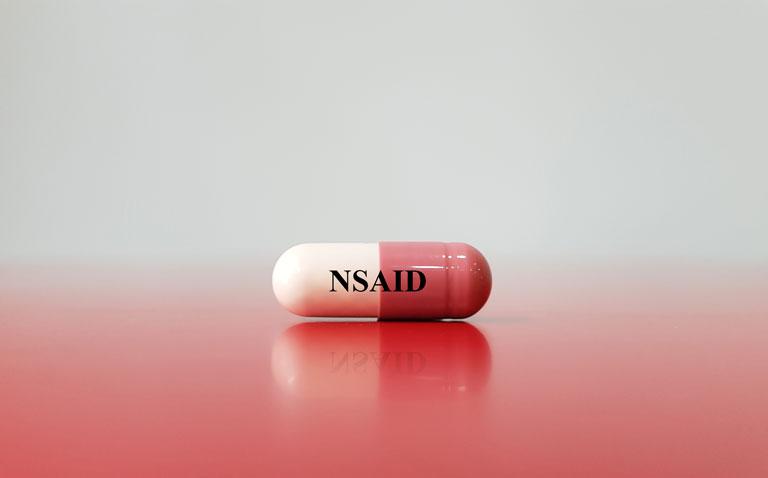
Aspirin and other should be avoided unless absolutely required because they usually result in gastritis or peptic ulcers.
Ibuprofen and others intended for human use are not suitable for use in dogs or cats. These medications cause deadly, severe intestinal and stomach ulcers.
Please take a minute to visit this website regarding NSAIDS, and the issue with giving them long term, as well as more in depth information about how they work in our patients. https://www.dogsnaturallymagazine.com/think-twice-before-using-nsaids/
If you would like more information you can contact us through our contact form.
Read reviews check out our Google Reviews online. Click Here
We are the only Dog knee brace site who offers advice and tips on holistic and homeopathic supplements. We believe in natural healing. We use and recommend the following products. We do not get paid from any of these companies, who do not even know we recommend their products. We are not part of any affiliate program. We have included links for your convenience, but feel free to look into other companies who sell the same products. As with all the content of this website, it is not to be construed as medical advice in any form. If you seek medical advice, consult with a veterinarian.
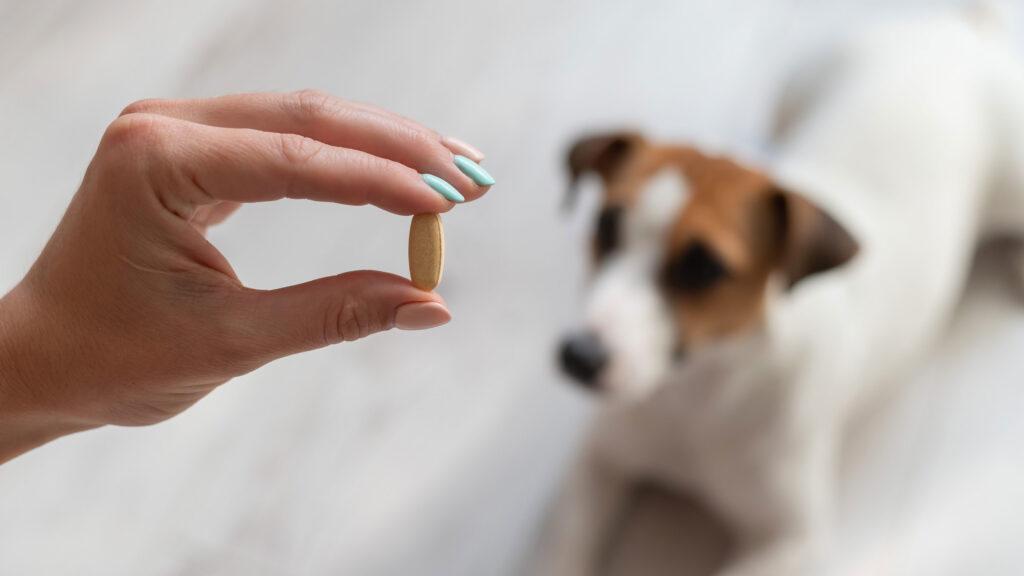
In addition to wearing a Dog Knee Brace for a K9 torn knee ligament, Pasha is given a daily “cocktail” of high quality supplements which support healing, accelerate tissue repair, and help alleviate pain and inflammation in her injured knee. We use a mix of supplements, including Nupro Silver for Dogs with CCL or ACL Injuries. Nupro Silver is a fabulous, high quality nutritional complex supplement which contains glucosamine, kelp, shark cartilage, MSM and other ingredients which can help your Dog recover from a ligament injury along with a Dog stifle brace, exercise, and conservative management.
You can get Nupro Silver online.
Ever since Pasha suffered a complete rupture of the Cranial Cruciate Ligament (CCL) in her left hind leg in 2013, part of her recovery has included a special, yet simple, daily “bone juice” which we give our 72 lb. Golden. She gets this once every AM and then the rest of her food throughout the day. (She fully recovered from her complete rupture over 14 months ago and no longer wears her Posh Dog Knee Brace).
Wearing a Dog knee brace for a canine CCL injury is just one part of the holistic approach and solution for a Dog ACL knee injury.
We buy the Nupro Silver from www.USBones.com. It comes in various sizes. This outstanding nutritional supplement for joint and connective tissue health contains glucosamine, sea kelp, shark cartilage and other beneficial ingredients!
When combining Nupro Silver with Glyco-Flex 3, be sure not to exceed the ingredients, as there is ingredient redundancy in these products.
The Alaskan wild salmon oil offers a high concentration of Omega-3 essential fatty acids and in more effective concentrations and higher quality than traditional fish oil.
Shop around for the spirulina, green lipped mussel, and tumeric to get the best pricing.
Some credible websites recommend UP TO 500 MG of glucosamine per 25 pounds of body weight. It may be a good idea to gradually build up to the appropriate dosage over a few weeks. Please read the entire article, particularly the section about contraindications. BTW this site has lots of truthful and outstanding articles about Dog Health – a must read!
We give our Golden baby 4 oz of DECAF green tea in her bone juice, since it is so beneficial for preventing cancer and overall health, BUT it MUST be decaf – caffeine can be very dangerous for Dogs! BTW check back soon for tips on avoiding and treating cancer in Dogs.
Remember that helping a Dog recover from a partial or complete rupture of the ACL involves more than just a well-built custom Dog knee brace or Dog stifle brace for a canine knee injury from Posh Dog Knee Brace, it also involves nutritional supplements and conservative management! Look for our upcoming blog about this.
Wishing your Dog a long, healthy and fulfilled life! Give your beautiful Dog a BIG hug from all of us at PoshDogKneeBrace.com!
Update # 1: In addition to giving Pasha DECAF [caffeine will harm Dogs!] green tea each day as an anti-cancer measure, we’ve also added a daily capsule of medicinal mushrooms: Reishe, Maitake and Shiitake mushrooms. Even though Pasha does not have cancer, given her age, we are introducing herbs and other confirmed, safe, anti-cancer agents to her daily routine.
We learned about this amazing mushroom mixture, used by Eastern (real) doctors for many centuries, at AnimalWellnessMagazine.com, a fabulous magazine that promotes REAL heath, and NOT big-pharma, 100% profit-based “health” in Dogs!
Update # 2: Although she presents with no symptoms of cancer or malignancies, and as apreventative measure, and after spending >> hundreds << of hours researching confirmed alternative and authentic treatments for cancer (many say cures), each day we give Pasha 6 crushed, raw, unpasteurized apricot kernels which we buy from ApricotPower.com These MUST be unpasteurized seeds, since pasteurization removes most nutrients from any food. Just search LongLivingPets.com to learn more, or search “laetrile cures cancer”. Apricot seeds have a very high density of naturally occurring laetrile.
Update #3: Now That Pasha is 13, she is no longer fond of mixing a lot of the foregoing supplements in decaf green tea. We now give her supplements wrapped (hidden) in fresh ground turkey “eggs,” i.e. Packed into about 2 tsp. of ground turkey. For the supplements in powder form, like the ground apricot seeds and Nupro Silver, we fill large gelatin capsules and wrap those with ground turkey. You can buy 500 large gelcaps on amazon for almost nothing.
(C) Copyright 2015
Contact us for more informatin. Click Here
Read reviews check out our Google Reviews online. Click Here